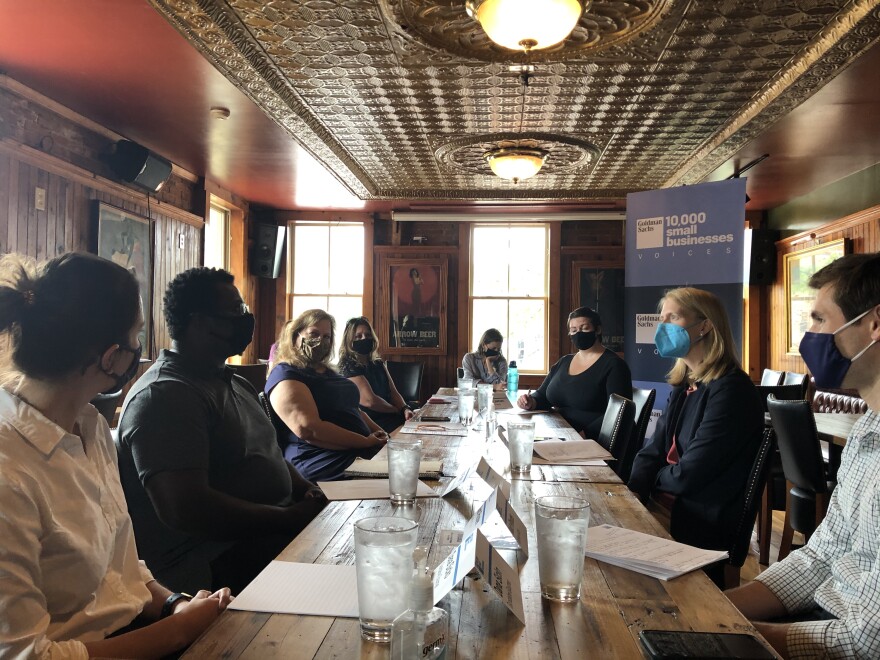Baltimore restaurant owners have been “pivoting” their business models to survive during the pandemic. And, as the Delta variant spreads, the pivoting continues.
At a Monday meeting at Max’s Taphouse at Fells Point, they shared how they’re continuing to grapple with sharply increasing costs, “broken” supply chains and staff shortages.
Gail Furman, the owner of Max’s, said she had to close her doors for three and a half months at the beginning of the pandemic. That was followed by a lot of “pivoting.”
“It’s a day by day journey,” she said.
They did carry out, but no delivery, which Furman said wasn’t very feasible. They also had to completely change their menu.
Now Max’s is open with indoor and patio seating. But Furman said things haven’t really gotten easier.
“This building, our property holds 500 people capacity,” Furman said. “There are not 500 people unfortunately to come in here at this point in time.”
Furman was on the second floor of her bar with other small business owners and Delegate Brooke Lierman, a Democrat representing South Baltimore.
Furman said visitors rarely use the second floor anymore. It’s only open on Friday nights.
Staffing, she said, is a “huge issue.” The staff that remain are worried about the Delta variant. Some want the bar to have a vaccine mandate for its staff.
“I'm fearful for what's coming down the pike again,” she said. “Really fearful.”
Some restaurants have been able to benefit from revitalization grants. Furman, who hasn’t received that funding, said that kind of aid can help businesses dramatically.
“There's the haves and have nots,” she said.
Dana Sicko is the owner of Gundalow Gourmet, which did catering and personal chef services before the pandemic. Gundalow gave up catering and opened a brick-and-mortar store in Hampden last June.
Sicko said their biggest problem has been supply costs. A box of disposable gloves, for example, was $18 before COVID. Now, Sicko said, you can get a box on sale for $60.
“They were once $95,” she said. “And we use a lot of gloves, because we want to keep everyone safe.”
Like Furman, Sicko said the pandemic forced her into a lot of pivoting.
“I feel like we're back to just throwing a bunch of things at the wall, seeing what sticks,” she said.
Khari Parker, the co-owner of Connie’s Chicken and Waffles -- which has several locations in the city -- said the price of chicken has nearly doubled.
“We've been doing digging,” he said. “I guess there's staff shortages at factories. So their output isn't as high as it should be.”
Anna Leventis, owner of SoBo Cafe in Federal Hill, said friends in other businesses, like retail stores, told her they’re having similar issues.
“Overall, our supply chain is broken,” Leventis said. “And even though I'm trying to really manage expenses, there's times that if I can get it, I buy as much as I can.”
For Parker, higher chicken prices mean he and his team members have to take extra steps to prevent having to raise prices for customers.
“All of those small things that pre-COVID we may not have thought as much about, we think a lot more now,” he said. “Any waste. We're tracking waste, we're really doing a deep dive.”
For restaurants, raising prices has sometimes been inevitable, and customers get upset. Sicko said it can be difficult trying not to show customers how much she and others in the industry are struggling.
“People think we're just charging too much, or we have to be the ones to say put on your mask, please,” Sicko said.
Ginny Lawhorn, the owner of the restaurant Friends & Family in Fells Point, told WYPR her staff voted to get vaccinated together. But she’s still worried about the safety of her customers.
Safety rules can be difficult to implement, Lawhorn said, especially without detailed statewide guidance and with masking rules that vary by county.
“We're doing the best we can with what we have and as gracefully as possible, and still being engaged members of the community,” Lawhorn said.
Furman is asking her customers to understand what she and other restaurant owners are dealing with.
“We’re going through the experience, just like you are. We’re having to deal with a lot of things you're not aware of,” Furman told WYPR. “Just be patient and kind to the people that you're dealing with.”




